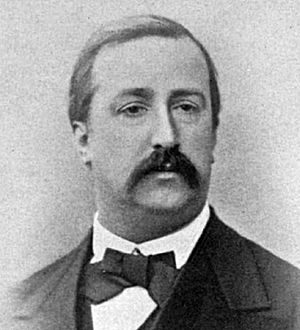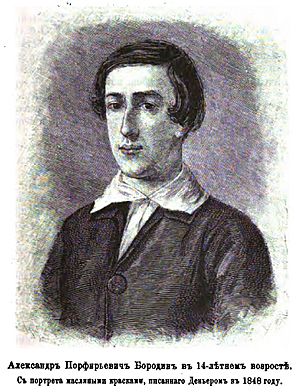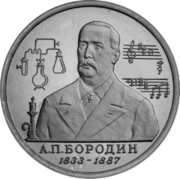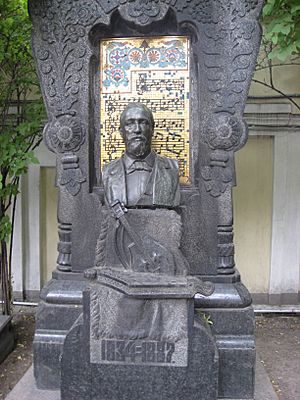Alexander Borodin facts for kids
Alexander Porfiryevich Borodin (Russian: Александр Порфирьевич Бородин, tr. Aleksandr Porfir’yevich Borodin; 12 November 1833 – 27 February 1887) was a famous Romantic composer and a talented chemist. He was from Russia and had some Georgian family background.
Borodin was one of the important 19th-century composers known as "The Five". This group wanted to create classical music that sounded truly "Russian." Borodin is best known for his symphonies, his two string quartets, the symphonic poem In the Steppes of Central Asia, and his opera Prince Igor.
Even though he is famous as a composer today, Borodin was a doctor and chemist by profession. He made important discoveries in organic chemistry. He saw medicine and science as his main jobs. He only worked on music in his free time or when he was sick. As a chemist, Borodin is known for his work on how chemicals react. He was one of the first to show nucleophilic substitution. He also helped discover the aldol reaction. Borodin believed in education in Russia. He helped start the School of Medicine for Women in Saint Petersburg. He taught there until 1885.
Contents
Life and Work
His Early Life and Family
Alexander Borodin was born in Saint Petersburg. His father was a Georgian nobleman, and his mother was a Russian woman. Because of how he was born, his father had him registered as the son of one of his serfs. This is how Borodin got his last name.
When Alexander was seven, his father freed him from serfdom. He also gave him and his mother a home and money. Even so, his mother was never publicly known as his mother. Young Borodin called her his "aunt."
Even though he was registered as a commoner, Borodin had a good life. His father made sure he was well cared for. He grew up in a big four-story house. He received a good education at home from private teachers.
In 1850, he joined the Medical–Surgical Academy in Saint Petersburg. He decided to study chemistry there. After graduating, he worked as a surgeon in a military hospital for a year. Then, he spent three years studying science in Europe.
In 1862, Borodin came back to Saint Petersburg. He became a chemistry professor at the Imperial Medical-Surgical Academy. He spent the rest of his science career doing research, teaching, and guiding other students. In 1872, he even started medical courses for women.
He began taking music lessons from Mily Balakirev in 1862. In 1863, he married Ekaterina Protopopova, who was a pianist. They adopted several daughters. Music stayed a hobby for Borodin. His main work was as a chemist and doctor. He often had poor health. He had cholera and several small heart attacks. He died suddenly during a ball at the Academy. He was buried in Tikhvin Cemetery in Saint Petersburg.
His Work as a Chemist
Borodin earned a lot of respect in his chemistry career. He was especially known for his work on aldehydes. From 1859 to 1862, Borodin worked at Heidelberg University. He studied how chemicals react. He also spent time in Pisa.
In 1862, he published an experiment. It showed how to replace chlorine with fluorine in a chemical called benzoyl chloride. In 1861, Borodin also showed how to make methyl bromide from silver acetate. This was a new way to remove a part of a chemical. Later, Heinz and Cläre Hunsdiecker used Borodin's work to create a general method. This method is now called the Hunsdiecker reaction or the Hunsdiecker–Borodin reaction.
In 1862, Borodin returned to the Medical–Surgical Academy. He became a chemistry professor there. He worked on how small aldehydes combine. This process is now called the aldol reaction. Borodin and Charles Adolphe Wurtz are both credited with discovering it. Borodin studied how different aldehydes reacted. He shared his work with the Russian Chemical Society in 1873.
His last full article was published in 1875. It was about reactions of amides. His very last publication was about how to find urea in animal urine. His son-in-law, Aleksandr Dianin, took over his chemistry professorship.
His Music Career
Opera and Orchestral Music
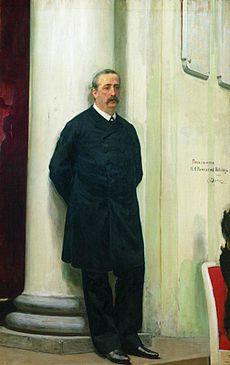
Borodin met Mily Balakirev in 1862. Balakirev taught him how to compose music. Borodin then started his Symphony No. 1. It was first performed in 1869. That same year, Borodin began his Symphony No. 2. It was not very popular at first. But after some changes, it was performed successfully in 1879.
In 1880, he wrote the popular symphonic poem In the Steppes of Central Asia. Two years later, he started a third symphony. But he died before he could finish it. Two parts of it were later completed by Alexander Glazunov.
In 1868, Borodin started working on his opera Prince Igor. Many people think this is his most important work. It is one of the most significant Russian operas. The opera includes the Polovtsian Dances. These dances are often performed alone in concerts. They are probably Borodin's most famous music. Borodin left Prince Igor and some other works unfinished when he died.
Prince Igor was finished after his death by Rimsky-Korsakov and Alexander Glazunov. The story takes place in the 12th century. Prince Igor of Russia leads his troops to fight the Polovtsians. These were a nomadic tribe who often attacked southern Russia. A solar eclipse at the start of the opera hints at a bad outcome. Prince Igor's troops are defeated. The story shows Prince Igor and his son being captured by Khan Konchak, the Polovtsian chief. Khan Konchak treats his prisoners well. He orders his slaves to perform the famous 'Polovtsian Dances'. These dances are a thrilling part of the opera. Later, Prince Igor returns home. He is welcomed by his townspeople and his wife, Yaroslavna.
Chamber Music
Borodin was very interested in absolute music. This is music that is not meant to tell a story or describe something. He showed this in his two string quartets. He also wrote many other chamber pieces before these. As a cellist, he loved playing chamber music. This interest grew when he studied chemistry in Heidelberg from 1859 to 1861. During this time, he wrote a string sextet and a piano quintet. Borodin's music in these pieces was inspired by Felix Mendelssohn.
In 1875, Borodin started his First String Quartet. Other members of The Five did not like chamber music. But Borodin's First Quartet shows his skill in writing for string quartets. Borodin's Second Quartet was written in 1881. It has a strong, beautiful melody. The third part of it is a popular "Nocturne." The First Quartet has many changes in mood. The Second Quartet has a more consistent and emotional feel.
Musical Legacy
Borodin's music became known outside of Russia during his lifetime. This was thanks to Franz Liszt, who arranged a performance of his Symphony No. 1 in Germany in 1880. Also, the Comtesse de Mercy-Argenteau helped his music become known in Belgium and France.
His music is known for its strong melodies and rich harmonies. As a member of The Five, his music also has a unique Russian style. His passionate music and unusual harmonies influenced younger French composers like Debussy and Ravel. Ravel even wrote a piano piece in 1913 called "À la manière de Borodine" (In the style of Borodin).
The beautiful and vivid qualities of Borodin's music, especially In the Steppes of Central Asia, his Symphony No. 2, and Prince Igor, led to his music being used in the 1953 musical Kismet. This musical was created by Robert Wright and George Forrest. Famous songs from Kismet that use Borodin's music include "Stranger in Paradise", "And This Is My Beloved", and "Baubles, Bangles, & Beads". In 1954, Borodin was given a Tony Award after his death for his music in this show.
See Also
 In Spanish: Aleksandr Borodín para niños
In Spanish: Aleksandr Borodín para niños
 | Frances Mary Albrier |
 | Whitney Young |
 | Muhammad Ali |


